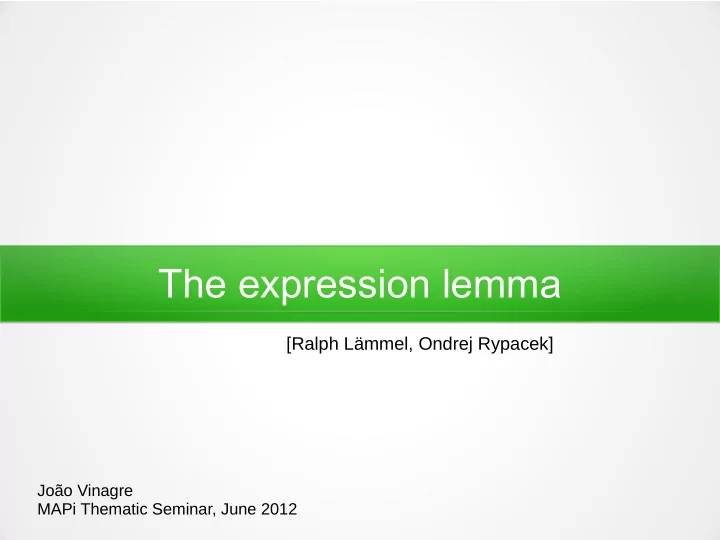

The expression lemma [Ralph Lämmel, Ondrej Rypacek] João Vinagre MAPi Thematic Seminar, June 2012
Outline 1. Introduction and motivation 2. Programming: Functional vs OO 3. Simple expression lemma 4. Generalized expression lemma 5. Related work 6. Conclusions and future work 2
Introduction Problem Recursive Program OO paradigm Functional paradigm 3
Functional vs OO Recursive functions on Recursive methods on algebraic data type object state We know (by code inspection) that these two are semantically equivalent But can we prove it? (Mathematically!) 4
Algebras and coalgebras ● Functional programs: ● formalized in algebras of functional folds (catamorphisms) ● OO programs: ● formalized in coalgebras of object unfolds (anamorphisms) ● (Co)algebraic specification example (binary tree with labels): 5
Algebras and coalgebras ● Functional programs: ● formalized in algebras of functional folds (catamorphisms) ● OO programs: ● formalized in coalgebras of object unfolds (anamorphisms) ● (Co)algebraic specification example (binary tree with labels): 6
The expression lemma … defines a proper correspondence between anamorphically (and coalgebraically) phrased OO programs and catamorphically phrased functional programs. 7
Simple expression lemma Given a distributive law λ : FB → BF , we can define an arrow μF → νB using the derivations: 8
Generalized expression lemma ● Same reasoning, but lifts to monads and comonads ● Some additional properties need to be met Given a monad 〈 T, η,μ 〉 , a comonad 〈 D, η , δ 〉 and a distributive law Λ : TD → DT of the monad T over D : 9
Related work ● Functional OO programming languages ● Moby, .NET (C#/VB + LINQ), F#, Scala, OCaml, … ● Focus is on extending existing OO languages to support the functional paradigm (or vice-versa) ● However they do not try to establish a formal correspondence between OO and functional programs ● The expression problem [Wadler] ● Language code extensibility problem (both term- and operation-wise) ● Assumes the expression lemma, however with less structure 10
Related work (continued) ● Operational semantics [Turi and Plotkin] ● Denotational and operational semantics corresponds to functional and OO, respectively. ● Distributive laws ● Languages with binders in presheaf category [Fiore, Plotkin and Turi] ● Recursive constructs [Klin] ● Modular constructions on distributive laws [Jacobs] ● Distributive laws for recursion and corecursion [Pardo, Uustalu, Vene et al] 11
Conclusions ● Given: ● a recursive functional program expressed in catamorphisms (folds); ● a recursive OO program expressed in anamorphisms (unfolds); ● we can prove the semantic equivalence between both (if they are in fact equivalent) 12
Limitations / Open issues ● Not everything is linearly recursive! → a more general lemma is necessary for many real world problems ● Now that we can establish semantic equivalence, we should take advantage of this (e.g. bidirectional code refactoring) → not trivial 13
● 14
Recommend
More recommend